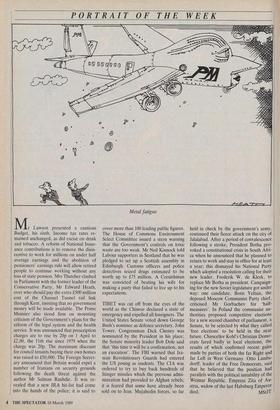PORTRAIT OF THE WEEK
Metal fatigue Mr Lawson presented a cautious Budget, his sixth. Income tax rates re- mained unchanged, as did excise on drink and tobacco. A reform of National Insur- ance contributions is to remove the disin- centive to work for millions on under half average earnings and the abolition of pensioners' earnings rule will allow retired people to continue working without any loss of state pension. Mrs Thatcher clashed in Parliament with the former leader of the Conservative Party, Mr Edward Heath, over who should pay the extra £500 million cost of the Channel Tunnel rail link through Kent, insisting that no government money will be made available. The Prime Minister also stood firm on mounting criticism of the Government's plans for the reform of the legal system and the health service. It was announced that prescription charges are to rise by 20p on 1 April to £2.80, the 11th rise since 1979 when the charge was 20p. The maximum discount for council tenants buying their own homes was raised to £50,000, The Foreign Secret- ary announced that Britain would expel a number of Iranians on security grounds following the death threat against the author Mr Salman Rushdie. It was re- vealed that a new IRA hit-list had come into the hands of the police; it is said to
cover more than 100 leading public figures. The House of Commons Environment Select Committee issued a stern warning that the Government's controls on toxic waste are too weak. Mr Neil Kinnock told Labour supporters in Scotland that he was pledged to set up a Scottish assembly in Edinburgh. Customs officers and police detectives seized drugs estimated to be worth up to £75 million. A Cornishman was convicted of beating his wife for making a pasty that failed to live up to his expectations.
TIBET was cut off from the eyes of the world as the Chinese declared a state of emergency and expelled all foreigners. The United States Senate voted down George Bush's nominee as defence secretary, John Tower. Congressman Dick Cheney was nominated by the President in his place; the Senate minority leader Bob Dole said that 'this time it will be a confirmation, not an execution'. The FBI warned that Ira- nian Revolutionary Guards had entered the US posing as students. The CIA was ordered to try to buy back hundreds of Stinger missiles which the previous admi- nistration had provided to Afghan rebels; it is feared that some have already been sold on to Iran. Mujahedin forces, so far held in check by the government's army, continued their fierce attack on the city of Jalalabad. After a period of convalescence following a stroke, President Botha pro- voked a constitutional crisis in South Afri- ca when he announced that he planned to return to work and stay in office for at least a year; this dismayed his National Party which adopted a resolution calling for their new leader, Frederik W. de Klerk, to replace Mr Botha as president. Campaign- ing for the new Soviet legislattire got under way: one candidate, Boris Yeltsin, the deposed Moscow Communist Party chief, criticised Mr Gorbachev for 'half- measures'. In Poland the communist au- thorities proposed competitive elections for a new second chamber of parliament, a Senate, to be selected by what they called `free elections' to be held in the near future. Chancellor Kohl's Christian Demo- crats fared badly in local elections, the results of which confirmed recent gains made by parties of both the far Right and far Left in West Germany. Otto Lambs- dorff, leader of the Free Democrats, said that he believed that the position had parallels with the political instability of the Weimar Republic. Empress Zita of Au- stria, widow of the last Habsburg Emperor


























































 Previous page
Previous page